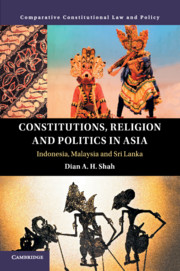Crossref Citations
This Book has been
cited by the following publications. This list is generated based on data provided by Crossref.
CROUCH, Melissa
2018.
Constitutionalism, Religion, and Inequality: Perspectives from Asia.
Asian Journal of Comparative Law,
Vol. 13,
Issue. 2,
p.
233.
Christian Green, M.
and
Toft, Monica Duffy
2018.
Freedom of Religion or Belief Across the Commonwealth: Hard Cases, Diverse Approaches.
The Review of Faith & International Affairs,
Vol. 16,
Issue. 4,
p.
19.
Moustafa, Tamir
2018.
The Judicialization of Religion.
Law & Society Review,
Vol. 52,
Issue. 3,
p.
685.
SCHONTHAL, Benjamin
2018.
Buddhism and Constitutional Practice.
Asian Journal of Comparative Law,
Vol. 13,
Issue. 2,
p.
245.
HARDING, Andrew
2018.
Law, Religion, and Constitutionalism in Asia.
Asian Journal of Comparative Law,
Vol. 13,
Issue. 2,
p.
227.
Goh, Joseph N.
2019.
Untying tongues: negotiations and innovations of faith and gender among Malaysian Christian trans men.
Culture and Religion,
Vol. 20,
Issue. 1,
p.
1.
NEO, Jaclyn L.
2020.
A Contextual Approach to Unconstitutional Constitutional Amendments: Judicial Power and the Basic Structure Doctrine in Malaysia.
Asian Journal of Comparative Law,
Vol. 15,
Issue. 1,
p.
69.
Bose, Neilesh
2021.
The History of Afghanistan as Global History.
Comparative Studies of South Asia, Africa and the Middle East,
Vol. 41,
Issue. 2,
p.
237.
Burton, Guy
2021.
Middle power behavior under multipolarity: Indonesia and Malaysia in the Middle East since the Arab uprisings.
Asian Politics & Policy,
Vol. 13,
Issue. 2,
p.
228.
Iqbal, Muhammad
and
Farmanullah
2023.
Gender perception regarding impact of religion on voting behaviour in 2018 general elections: a case study of district Dir Upper, Pakistan.
Journal of Humanities, Social and Management Sciences (JHSMS),
Vol. 4,
Issue. 1,
p.
41.
Viola, Pasquale
2023.
Local Governance in Multi-Layered Systems.
Vol. 108,
Issue. ,
p.
455.
Goh, Joseph N.
2024.
Everyday precarity, oblique hostility and gendered liveability among Malaysian transgender men.
Journal of Gender Studies,
Vol. 33,
Issue. 4,
p.
458.





